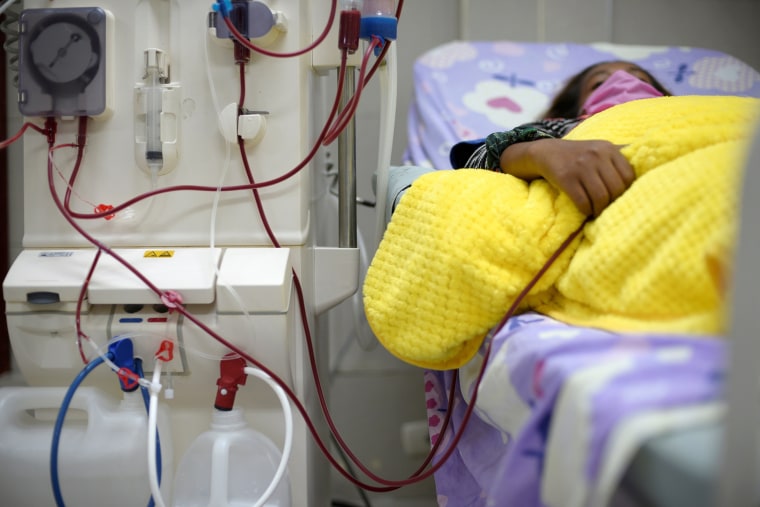A significant number of the sickest coronavirus patients have kidney problems, complicating their treatment and hurting their chances of survival.
Exactly how the virus affects the kidneys — which play a vital role in cleaning the body's blood supply — is still unclear, but experts have theories.
Full coverage of the coronavirus outbreak
One is that the coronavirus directly attacks the kidneys. A study published in the journal Cell in March showed that the coronavirus infiltrates the body by binding to a type of receptor on cells called ACE2. These special receptors are found not only in cells in the heart and lungs, but also in kidneys.
"ACE2 receptors are essentially docking sites" for the virus, Dr. George Thomas, a nephrologist at the Cleveland Clinic's Glickman Urological and Kidney Institute, said.
But it's also possible that the kidney damage seen in coronavirus patients occurs secondary to the viral infection, because the body is unable to deliver enough oxygen to organs, the president of the National Kidney Foundation, Dr. Holly Kramer, told NBC News. COVID-19 hits the lungs hard, making it difficult for people's bodies to get the oxygen it needs.
The damage could also be the result of the virus's effects on the blood, which can lead to clots.
Kidneys filter blood through thousands of tiny capillaries, which are highly susceptible to clots.
Blood clotting is most likely an effect of the body's immune system going haywire, raising levels of inflammation in what's called a cytokine storm.
"The cytokines are supposed to attack the virus, but the immune system ends up releasing an overwhelming amount of these cytokines, and they end up attacking our own cells and tissues," Thomas said.
Clogging the body's filter
The main job of the kidney is to clean the blood by removing toxins and extra salt and water from the blood, and adding back what the body does need.
The kidneys are basically "taking out the garbage and putting out the recycling constantly, every single second," Kramer explained. "So if those little capillaries all of a sudden get clogged up, and the blood can't move well, they're not going to be able to filter the blood very well."
Dialysis machines, which work by filtering a person's blood outside the body, are used when a patient's kidney function is poor. But blood from COVID-19 patients is clotting so much, doctors have found, that it's clogging the filters in dialysis machines. As a result, physicians say they must add blood thinners to patients' treatment regimens so the dialysis machines can do their jobs.
Complicating treatment
Reduced kidney function, in turn, complicates how ICU doctors often treat patients with respiratory illnesses.
Studies have shown critically ill patients with lung problems tend to do better if their fluids are kept low.
"The theory behind that is any fluid you give leaks into the lungs and makes oxygen and ventilation worse," Dr. Hugh Cassiere, a pulmonologist and the medical director of Respiratory Care Services at North Shore University Hospital on Long Island, New York, said.
But, he said, when the kidneys aren't working properly, doctors are unable to remove as much fluid because the patients aren't urinating. "So all you're putting in is not coming out, and that could make the lungs worse."
Cassiere estimates 30 percent to 40 percent of the COVID-19 patients on ventilators in his intensive care unit are developing acute kidney problems, a sign of a potentially bad outcome.
"Whenever you're in the intensive care unit, and you develop kidney injury, it's a marker for increased risk of death," Cassiere told NBC News.
Download the NBC News app for full coverage of the coronavirus outbreak
An estimated 37 million people in the U.S. have chronic kidney disease, according to the Centers for Disease Control and Prevention.
People who are on dialysis and those who have had a kidney transplant have compromised immune systems, and are therefore at greater risk for infections in general. The National Kidney Foundation recommends those patients pay particular attention to guidance for social distancing and hand-washing.
Experts also urge patients to continue with their dialysis and any prescribed medications.
CORRECTION: (April 23, 2020, 11:09 a.m. ET): An earlier version of this article misstated the name of the organization Dr. Holly Kramer presides over. It is the National Kidney Foundation, not the National Kidney Association

